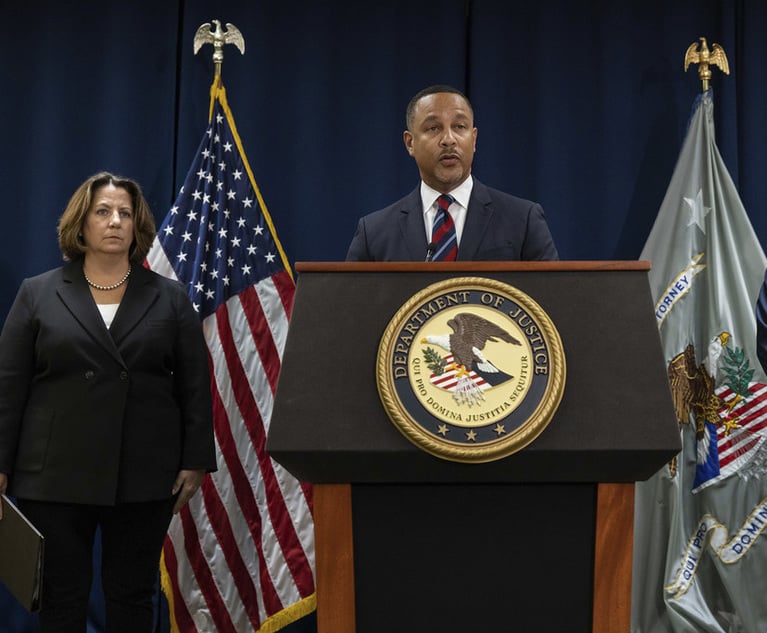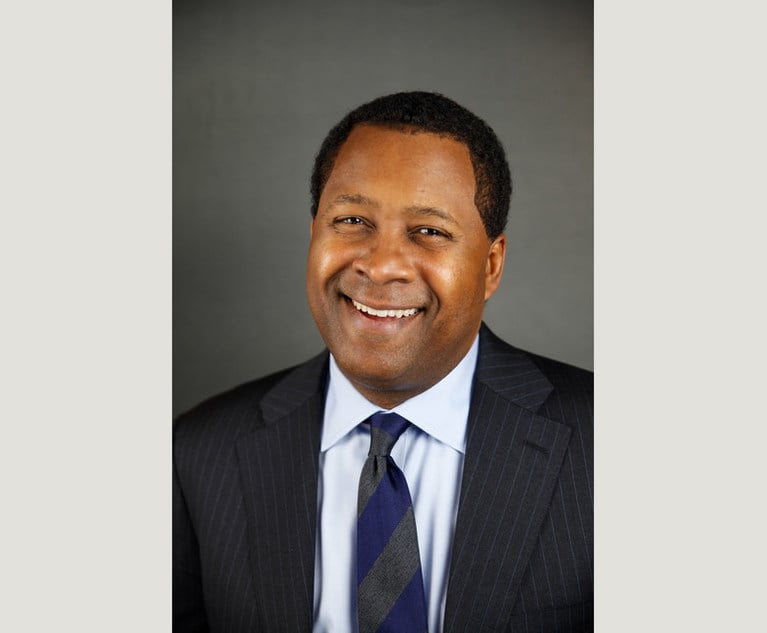Compliance Hot Spots: Dust-Up Over CFPB's Sandbox | Nasdaq Sues SEC | Ex-Apple Lawyer Charged | Suit Questions DOJ Wire Act Reversal
Equifax, the U.S. Chamber and others—including Democratic state attorneys general—have a lot to say about the CFPB's move to embrace a "product sandbox." Plus: Eugene Scalia's back in the DC Circuit, representing Nasdaq in a suit against the SEC. Scroll down for Who Got the Work, moves and more. Thanks for reading!
February 19, 2019 at 09:00 PM
10 minute read
Welcome to Compliance Hot Spots, our weekly look at the regulatory and white-collar enforcement world. Thanks for reading—and please continue to send feedback. I appreciate hearing from you about what's on your plate—observations, trends, new clients. I'm at [email protected] and 202-828-0315, or follow me on Twitter @cryanbarber.
Kicking Up Dust Over the CFPB Sandbox
In September 2017, as Richard Cordray's tenure leading the Consumer Financial Protection Bureau was winding down, the agency took a first step in its broader push to promote consumer-friendly innovation in the financial industry.
In a so-called “no-action” letter, the CFPB told Upstart Network Inc., an online lender founded by former Google employees, that it would not interfere with the company's underwriting model for consumer loans. The letter was meant to allow Upstart to breathe easier as it used alternative data—such as employment and education—in determining creditworthiness.
Almost a year and a half later, Upstart's no-action letter remains the only one the CFPB has ever issued. The new CFPB leadership wants to entice more companies to step into what it calls the “Product Sandbox” and pursue no-action letters.
But its proposal for providing more relief to recipients of those letters is receiving mixed reviews.
The proposal was unveiled formally in December, just as Mick Mulvaney, then the acting director, was on his way out. The bureau said in its announcement that since a 2016 policy was implemented the bureau had issued a lone “no action” letter.
“The bureau believes this strongly suggests that both the process required to obtain a no-action letter and the relief available under the 2016 Policy have not provided firms with sufficient incentives to seek no-action letters from bureau staff,” according to the CFPB's regulatory notice.
Back in December an American Banker news report called Mulvaney's sandbox announcement a “sweeping proposal removing the threat of legal liability for fintech companies that test products benefiting consumers.”
Democratic state attorneys general are inveighing against the proposal, while business advocates are generally supportive but seeking additional protective measures. Here's a snapshot highlighting some of the criticism, hopes and concerns:
>>New York attorney general and other Democratic state AGs: “The CFPB was created to protect consumers and ensure the financial stability of this country,” New York Attorney General Letitia James (above) said in a statement. “These proposed rule changes would have the complete opposite effect—putting blind faith in the very industries and services they are supposed to regulate and correct. At a time when so many Americans are struggling to make ends meet, the CFPB should be focused on protecting consumers, not advancing regulations that could hurt them.”
>> Innovative Payments Association: “We note that many states impose requirements on financial services companies that often match, or closely track, federal requirements. While the CFPB notes that it is interested in entering into agreements with state authorities, it is unclear if the CFPB intends to obtain assurances as part of these agreements that a participating company will not face state liability or if the CFPB instead believes that any state law requirements would be preempted through the granting of a NAL.”
>> American Bankers Association, U.S. Chamber and other business advocates: “Sensitive data collected from the institution pursuant to a Sandbox application and during a trial must be adequately protected. Much of this data will be proprietary business information that should be protected under exception four of FOIA. Since the bureau has exemptive authority for the statutes under the Sandbox proposal, it should be the only regulator with access to the data. Further, the bureau should ensure its information security protections are up to date and can adequately protect the information.”
>>Equifax: “Equifax supports the bureau's goal of facilitating innovation. As the bureau considers opportunities for innovation within the credit scoring and loan origination spaces, however, Equifax would like to emphasize the importance of explainability within credit scoring systems and highlight for the bureau that it is possible to benefit from the improved performance of machine learning without sacrificing the consumer protection of explainability.”
And the Context: CFPB has a new director, Kathy Kraninger, and we'll have to wait to see how far she wants to take things. “Since the bureau issued these proposals in the waning days of then-Acting Director Mick Mulvaney's tenure, it remains to be seen what Director Kraninger's views are on such proposals, and on innovation more generally,” writes Eamonn Moran of Kilpatrick Townsend Stockton.
Who Got the Work
>> Gibson, Dunn & Crutcher partner Eugene Scalia (above) is representing Nasdaq in a new challenge in the D.C. Circuit against an SEC pilot program that restricts the fees exchanges can charge for trading. Davis Polk & Wardwell litigation partner Paul Mishkin in New York is a lead attorney for the New York Stock Exchange, Chicago Stock Exchange and other plaintiffs in a related case filed in the D.C. Circuit. The SEC adopted the transaction fee pilot program in December. “I expect the data provided by the pilot will help us make effective policy assessments that will benefit our markets and our investors,” SEC Chair Jay Clayton said at the time. The Wall Street Journal has more on the new cases here.
>> Cognizant Technologies, represented by Latham & Watkins partner Douglas Greenburg, has agreed to pay $25 million to resolve charges that the New Jersey-based technology services company authorized bribes connected to the construction of offices in India. The SEC alleged two former Cognizant executives—president Gordon Coburn and chief legal officer Steven E. Schwartz—authorized a contractor building a campus in Chennai, India, to pay bribes totaling $3.6 million to a senior Indian government had demanded. Coburn is represented by Jones Day partner Henry Klehm III, a co-leader of the firm's securities litigation and SEC enforcement practice. Schwartz is being defended by Paul, Weiss, Rifkind, Wharton & Garrisonpartner Roberto Finzi, co-chairman of the firm's white-collar and regulatory defense group. Law.com has more here.
>> Kevin Marino of New Jersey's Marino, Tortorella & Boyle is representing Gene Levoff, a former Apple lawyer charged with insider-trading. Levoff was formerly global head of corporate law and corporate secretary Antonia Chion, associate director of the SEC's Division of Enforcement, said in a statement: “Levoff's alleged exploitation of his access to Apple's financial information was particularly egregious given his responsibility for implementing the company's insider trading compliance policy.” Responding to the criminal complaint, Marino said: “We are in the process of reviewing the allegations against Mr. Levoff, and we look forward to defending him with respect to those allegations.” Law.com has more here on the case.
>> Sidley Austin's Michael Warden in Washington, co-leader of the firm's accountants and professional liability practice, represented Deloitte Japan in a $2 million settlement with the Securities and Exchange Commission resolving claims that the company violated rules to safeguard the integrity of audits. The SEC alleged Deloitte issued audit reports for a client at a time when dozens of employees had bank accounts with the client's subsidiary. Deloitte Japan's former CEO Futomichi Amano was represented by Arnold & Porter partner Scott Schreiber in a separate settlement suspending him from practicing before the SEC as an accountant, with the ability to reapply after two years. Reuters has more on the settlement here.
Compliance Headlines: What Caught My Eye
>> “Here's the 'Extraordinary' Story of Treasury Nominee Bimal Patel, Ex-O'Melveny Partner.” Last week, Bimal Patel (above) went before the Senate Banking Committee for his confirmation hearing for a lead role at the U.S. Treasury Department. Patel recounted to the panel his birth and early childhood. The hearing wasn't all rosy. One member suggested Patel was being evasive in not directly answering whether he considers some banks still “too big to fail” years after the 2008 financial crisis. [Law.com]
>> “Watchdog: Bank Cop Didn't Enforce Conflict of Interest Rule for 15 Years.”“For a decade and a half, a top bank regulator failed to properly enforce an ethics rule prohibiting federal officials from having a financial interest in the industries they regulate, a key government watchdog told the White House and Congress.” [Politico]
>> “Partisan Rift Threatens Federal Data-Privacy Law.” “Silicon Valley and its Republican allies are pushing for a national standard that would override state regulations—including California's landmark 2018 law, which broadens the definition of personal information and gives consumers the right to prevent their data from being sold. They are running up against fierce resistance from Democrats.” [The Wall Street Journal]
>> “Gibson Dunn Team Sues Justice Department Over Reversal on Online Gambling.” The U.S. Justice Department's abandoning of a 2011 opinion that had permitted certain forms of internet gambling drew a legal challenge Friday from a online lottery company, which said the government's abrupt reversal was “deeply flawed” and the product of a lobbying campaign by a prominent Las Vegas casino magnate. A team from Gibson, Dunn & Crutcher, including appellate veteran Theodore Olson, represents plaintiff NeoPollard Interactive LLC. [Law.com]
>> “How SEC Enforcement Is Getting Back to Basics.” King & Spalding government investigations partner Russell Ryan in Washington writes: “Over the past two years the SEC has noticeably pulled back from its brief foray into 'broken windows' policing, whereby even unintentional, technical violations were penalized regardless of whether ordinary investors suffered any harm. The agency appears to have returned to its core enforcement mission, prioritizing cases where fraud or other intentional misconduct caused widespread harm to retail investors.” Ryan joined the firm last year from the Financial Industry Regulatory Authority, where he was senior vice president and deputy chief of enforcement. [NYU School of Law]
>> “What to Do When a Client Receives a Subpoena From Congress.” From Day Pitney counsel Steven Cash, a former chief counsel to Sen. Dianne Feinstein, on how U.S. House subpoenas could drive work for New York lawyers: “Congress is coming to New York, and New York lawyers should be ready to zealously, and effectively, represent clients in what may be an unfamiliar (and precarious) setting.” [New York Law Journal]
Notable Moves & Announcements
>> Kevin Arquit (above), formerly the co-leader of the antitrust group at Weil, Gotshal & Manges, is leaving for Kasowitz Benson Torres, according to NYT. Arquit joined Weil in 2017 from Simpson Thacher & Bartlett, where he led the antitrust practice.
>> McDermott Will & Emery has hired Khelin Aiken in Washington as counsel in the firm's life sciences and FDA groups. Aiken earlier served as a regulatory counsel at the FDA.
>> Amy Friend, a former chief counsel at the Office of the Comptroller of the Currency and at the Senate Banking Committee, has joined financial technology advisory firm FS Vector as a senior adviser. David Cotney previously commissioner of banks for the Massachusetts Division of Banks, also joins as a senior adviser. Friend retired from OCC in 2017.
This content has been archived. It is available through our partners, LexisNexis® and Bloomberg Law.
To view this content, please continue to their sites.
Not a Lexis Subscriber?
Subscribe Now
Not a Bloomberg Law Subscriber?
Subscribe Now
NOT FOR REPRINT
© 2025 ALM Global, LLC, All Rights Reserved. Request academic re-use from www.copyright.com. All other uses, submit a request to [email protected]. For more information visit Asset & Logo Licensing.
You Might Like
View All
Compliance Hot Spots: GOP Eyes ESG as an Antitrust Issue + Another DOJ Crypto Seizure + Sidley Partner Jumps to Main Justice
9 minute read
Compliance Hot Spots: Lessons from Lafarge + Fraud Section Chief Talks Compliance + Cravath Lands FTC Commissioner
11 minute readTrending Stories
Who Got The Work
J. Brugh Lower of Gibbons has entered an appearance for industrial equipment supplier Devco Corporation in a pending trademark infringement lawsuit. The suit, accusing the defendant of selling knock-off Graco products, was filed Dec. 18 in New Jersey District Court by Rivkin Radler on behalf of Graco Inc. and Graco Minnesota. The case, assigned to U.S. District Judge Zahid N. Quraishi, is 3:24-cv-11294, Graco Inc. et al v. Devco Corporation.
Who Got The Work
Rebecca Maller-Stein and Kent A. Yalowitz of Arnold & Porter Kaye Scholer have entered their appearances for Hanaco Venture Capital and its executives, Lior Prosor and David Frankel, in a pending securities lawsuit. The action, filed on Dec. 24 in New York Southern District Court by Zell, Aron & Co. on behalf of Goldeneye Advisors, accuses the defendants of negligently and fraudulently managing the plaintiff's $1 million investment. The case, assigned to U.S. District Judge Vernon S. Broderick, is 1:24-cv-09918, Goldeneye Advisors, LLC v. Hanaco Venture Capital, Ltd. et al.
Who Got The Work
Attorneys from A&O Shearman has stepped in as defense counsel for Toronto-Dominion Bank and other defendants in a pending securities class action. The suit, filed Dec. 11 in New York Southern District Court by Bleichmar Fonti & Auld, accuses the defendants of concealing the bank's 'pervasive' deficiencies in regards to its compliance with the Bank Secrecy Act and the quality of its anti-money laundering controls. The case, assigned to U.S. District Judge Arun Subramanian, is 1:24-cv-09445, Gonzalez v. The Toronto-Dominion Bank et al.
Who Got The Work
Crown Castle International, a Pennsylvania company providing shared communications infrastructure, has turned to Luke D. Wolf of Gordon Rees Scully Mansukhani to fend off a pending breach-of-contract lawsuit. The court action, filed Nov. 25 in Michigan Eastern District Court by Hooper Hathaway PC on behalf of The Town Residences LLC, accuses Crown Castle of failing to transfer approximately $30,000 in utility payments from T-Mobile in breach of a roof-top lease and assignment agreement. The case, assigned to U.S. District Judge Susan K. Declercq, is 2:24-cv-13131, The Town Residences LLC v. T-Mobile US, Inc. et al.
Who Got The Work
Wilfred P. Coronato and Daniel M. Schwartz of McCarter & English have stepped in as defense counsel to Electrolux Home Products Inc. in a pending product liability lawsuit. The court action, filed Nov. 26 in New York Eastern District Court by Poulos Lopiccolo PC and Nagel Rice LLP on behalf of David Stern, alleges that the defendant's refrigerators’ drawers and shelving repeatedly break and fall apart within months after purchase. The case, assigned to U.S. District Judge Joan M. Azrack, is 2:24-cv-08204, Stern v. Electrolux Home Products, Inc.
Featured Firms
Law Offices of Gary Martin Hays & Associates, P.C.
(470) 294-1674
Law Offices of Mark E. Salomone
(857) 444-6468
Smith & Hassler
(713) 739-1250














